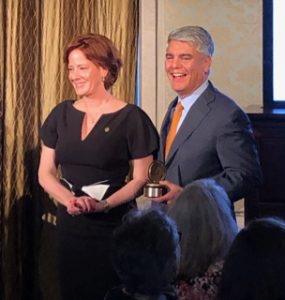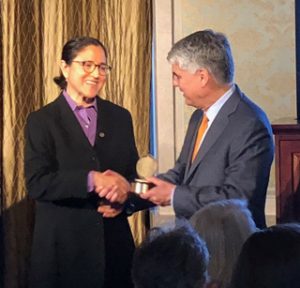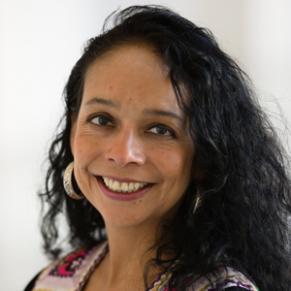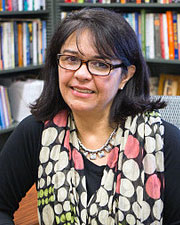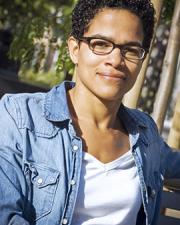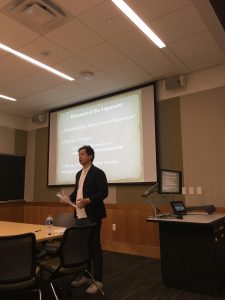Today the United States Senate voted narrowly to advance the nomination of Judge Brett Kavanaugh to a final confirmation vote, which will take place this Saturday. If confirmed, Kavanaugh will enjoy a lifetime appointment to the U.S. Supreme Court.
The vote took place after a polarizing public hearing in which a woman, Dr. Christine Blasey Ford, gave a testimony accusing Kavanaugh of sexual assault. During the hearing, Kavanaugh angrily denied the accusation, repeatedly interrupting, raising his voice, demanding answers to questions he himself was being asked, and decrying what he has called a “circus,” a “national disgrace,” and a “vicious” attack on his family and good name.
Senators made today’s decision in the wake of widespread protests (including an elevator confrontation with swing-vote Republican Sen. Jeff Flake), a withdrawn endorsement from the magazine of the Jesuit religious order, and urgings from Yale Law School and the American Bar Association, whose support Brett Kavanaugh cited just yesterday, and which Republican Senator Lindsey Graham called “the gold standard.” The ABA has since stated that Kavanaugh has not been sufficiently vetted for appointment to the Supreme Court. In a letter to the Senate Judiciary Committee, the ABA called for postponing the vote until the FBI completed “an appropriate background check into the allegations made by Professor Blasey and others.”
The Kavanaugh hearing has dominated the news cycle for weeks. It has sent waves of anger, sadness, confusion, frustration, and loss across the country, leaving many of us reeling and unsure how to process our emotions, let alone make sense of the situation.
A variety of social science researchers have published sociological responses to the hearings. This post is an effort to consolidate and share those works of public sociology. The following list includes analyses from scholars with expertise in the areas of law, race, class, gender, sexuality, and sexual violence.
“We Still Haven’t Learned From Anita Hill’s Testimony”
Kimberlé Crenshaw | The New York Times
In this New York Times op-ed, law professor Kimberlé Crenshaw, who introduced the term “intersectionality,” offers instructive words for white feminists and anti-racists. She shows that what many of us assume justice should look like—be it the outcome or the process—neglects to consider black women’s specific needs and circumstances:
I watched Anita Hill testify as a member of her support team. I worried that she would be trapped between an antiracist movement that foregrounded black men, and a feminism that could not fully address how race shaped society’s perception of black victims. …
Such colorblind feminism did a profound disservice to Ms. Hill. And it marked another key moment of political erasure — in this case, one that effaced modern feminist history. Treating the racial backdrop of the hearing as just noise meant that we missed an opportunity to create a nuanced understanding of sexual harassment. In the great awakening around sexual harassment, race was politely ushered offstage.
“Kavanaugh’s ‘Good Guy’ Defense Reveals a Dangerous Rape Myth”
Sarah Diefendorf | The Huffington Post
Masculinities scholar Sarah Diefendorf analyzes the discourses being proffered in defense of Kavanaugh. She points out that these defenses characterize men’s proclivity to commit sexual violence as something that individual “bad guys” do, and elide the reality that sexual violence is part of a system of masculine domination:
When Kavanaugh or other men respond to allegations of sexual assault by making themselves look like good guys, they’re trying to pin the blame on other “bad” men as failures of masculinity. This good guy defense is brilliant. It allows men to make the problem of sexual assault and rape about being an individual ― the work of bad men, not a bad culture ― when we know that it is actually a widespread cultural problem. When men point to others as the problem, we are left with individual accounts, denials, and explanations that hide the overarching theme in all of them: masculinity and dominance.
This good guy rhetoric repeats the same cycle we are all taught at an early age: that men are in charge of the conversation and of women’s bodies and that women’s voices are dismissed or berated when we dare speak up.
“A Sociological Take on the Kavanaugh Hearing”
Nicole Bedera | Scatterplot, a blog for public sociology
Sociologist Nicole Bedera, who studies adolescent sexual violence, synthesizes findings from social science about sexual violence. Her blog post (in addition to this Twitter thread) offers context for the hearing by sharing evidence not typically acknowledged in public discourse about sexual violence:
We generally think of sexual violence—and particularly its perpetration—as something rare. When we do recognize sexual misconduct as a common experience, we tend to focus on victimization and the stories we heard during the beginnings of #MeToo and imagine serial rapists as the primary perpetrators of sexual assault. However, sexual assault perpetration is similarly ordinary. According to one of the most recent and rigorous studies, as many as 10.8% of college-attending young men commit an act of rape before graduating (Swartout et al. 2015). The rate might be alarming, but the reasons are different than we traditionally think. … The allegations against Judge Kavanaugh are consistent with what sociologists know about sexual violence: it’s common, rooted in male bonding, and situational.
“Kavanagh is Lying. His Upbringing Explains Why.”
Shamus Khan | The Washington Post
Shamus Khan, whose 2012 book Privilege is an ethnography of an elite boarding school that Khan himself attended, examines the classed dimensions of the hearing. He details how elite institutions such as those Kavanaugh attended (Georgetown Prep, Yale College, and Yale Law School) socialize their members to believe they are entitled to positions of power, special treatment, and the ability to break rules with impunity:
Kavanaugh’s privilege runs deep, and it shows. He grew up in a wealthy Washington suburb where his father spent three decades as CEO of a trade association. There has been a sense among his supporters that his place is deserved, which mirrors the climate of aristocratic inheritance he grew up around. … This collective agreement that accountability doesn’t apply to Kavanaugh (and, by extension, anybody in a similar position who was a youthful delinquent) may help explain why he seems to believe he can lie with impunity — a trend he continued on Thursday, when he informed senators he hadn’t seen the testimony of his accuser, Christine Blasey Ford, even though a committee aide told the Wall Street Journal he’d been watching. In his furious interview with the panel that afternoon, Kavanaugh appeared astonished that anybody might impugn his character or try to keep him from the seat he is entitled to. ‘I’m never going to get my reputation back,’ he complained.
Katie K. Rogers is a doctoral student in the Department of Sociology at UT Austin. Her research is on race, gender, and the legal cannabis industry in the United States. You can follow her on Twitter at @katie_k_rogers.
